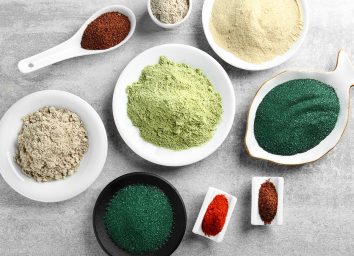Popular Foods You Should Avoid, According to the Mayo Clinic
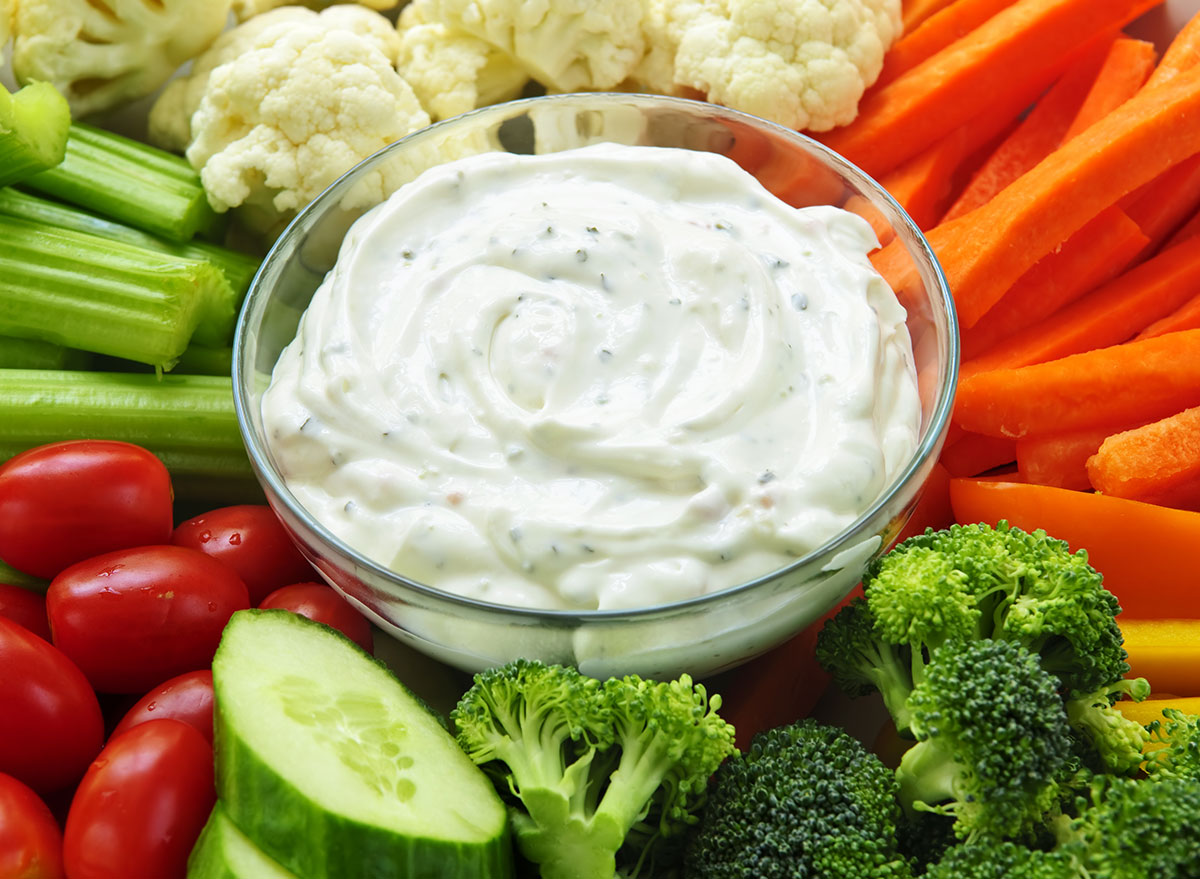
If you've read just about any medical publication, Googled any ailment, or turned on the news at any point in the last year, you're likely at least vaguely familiar with the Mayo Clinic: a nonprofit American academic medical center focused on integrated health care, education, and research. Though it sounds like one entity, the Mayo Clinic actually has campuses across the country, with a headquarters in Rochester, Minnesota. It employs around 63,000 medical professionals.
It's safe to say the people who work at the Mayo Clinic know a thing or two about health, especially as it relates to diet. In fact, the Mayo Clinic has even devised its own healthy eating regimen dubbed the Mayo Clinic Diet, which is an eating plan developed to help people lose weight and maintain a healthy weight for a lifetime.
Given its dedication to people's overall health, it's no surprise that the Mayo Clinic has also written about, and conducted research related to the foods one should avoid if they want to stay in the best shape possible.
For example, though the Mayo Clinic doesn't prohibit alcohol consumption, the organization does recommend consuming alcohol in moderation and no more than seven times per week. Scroll down to discover what other popular foods the Mayo Clinic suggests you steer clear of. Read on, and for more on how to eat healthy, don't miss 7 Healthiest Foods to Eat Right Now.
Processed Red Meats
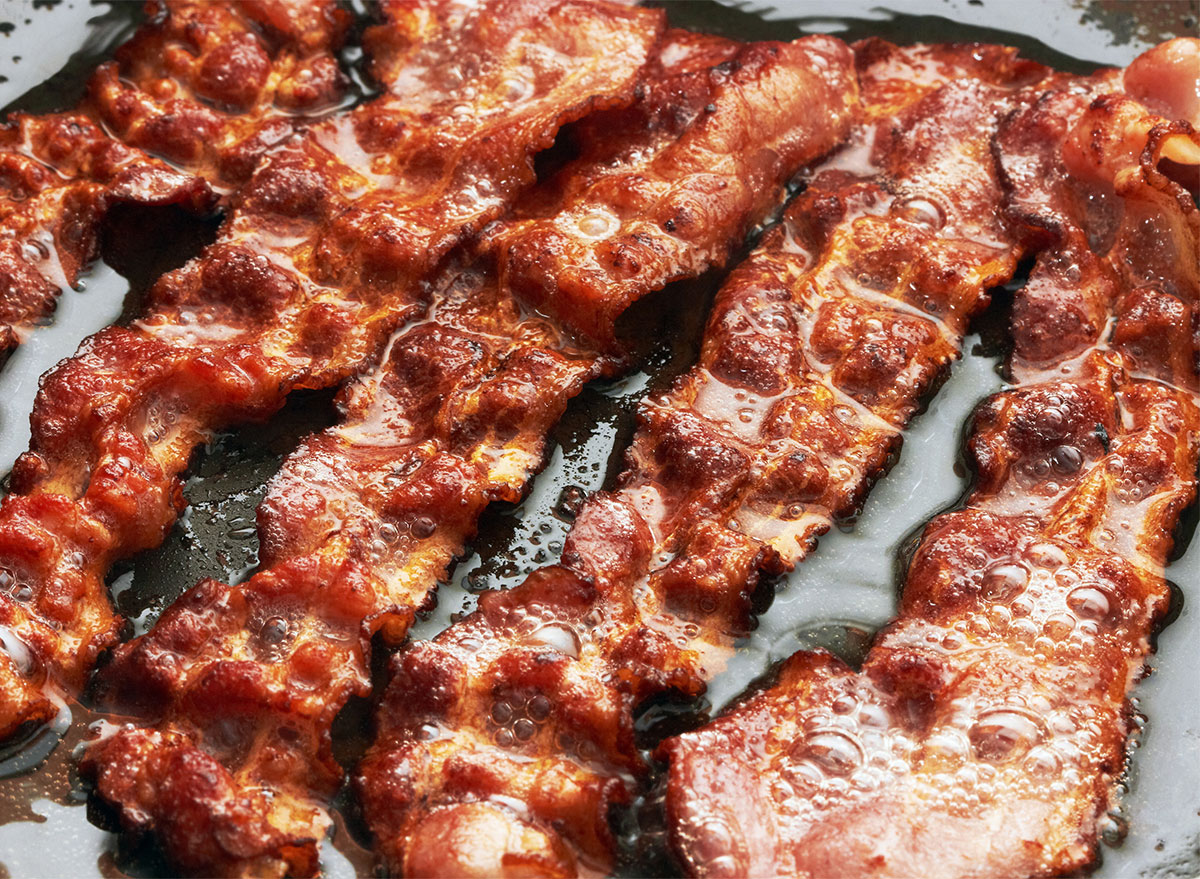
"A recent review of the research regarding red meat consumption looked at six studies that tracked more than 1.5 million people for 5.5 to 28 years," wrote Liza Torborg, of the Mayo Clinic in August 2018, citing Dr. Heather Fields. "The review found that regularly consuming processed meats is associated with increased risk of heart disease, cancer—especially colon cancer—and early death. Processed meats include bacon; sausage; hot dogs; ham; deli meats; canned meats; jerky; and meat that is processed, cured, fermented, or salted. These meats tend to be high in saturated fat, sodium, and nitrates or nitrites, which are thought to be implicated in their associated risks."
Fried Foods
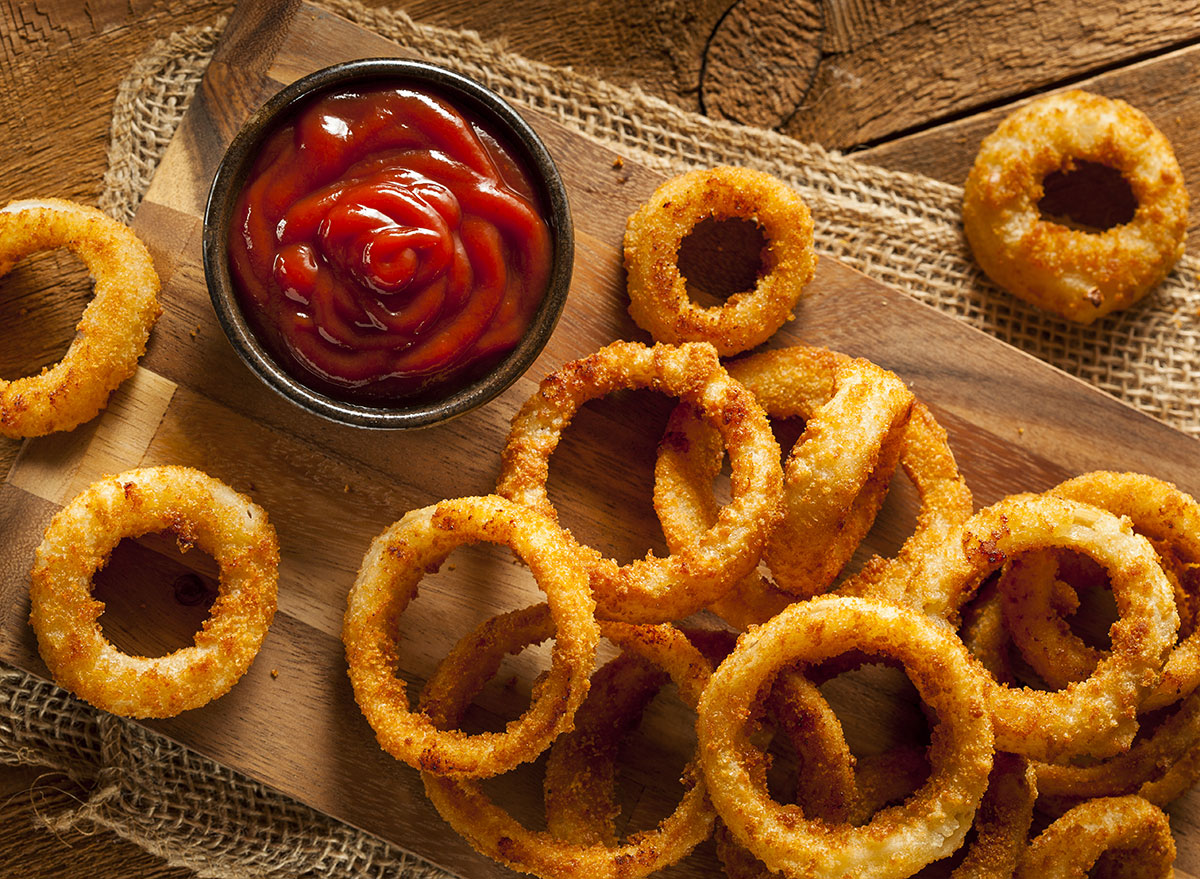
The health issues associated with the consumption of fried foods such as doughnuts, mozzarella sticks and French fries are well-documented, so it's not exactly a surprise that the Mayo Clinic warns against eating them too frequently.
"Researchers have linked fried foods to type-2 diabetes and heart problems, but studies also show that eating fried foods every day can shorten your life," notes The Mayo Clinic Minute. According to Stephen Kopecky, MD, a cardiologist at the Mayo Clinic, our bodies just weren't made to eat the amount of fried foods that exist today. "If you have a diesel engine, you don't put gasoline in your diesel tank," he explained.
Soda

Soda is one of the most popular foods around and, according to the experts at the Mayo Clinic, it's also one of the most harmful if consumed too often. Throwing back sugary drinks like soda can result in significant weight gain, wrinkly skin, an increase in triglycerides and more.
Frequent soda drinkers also have an increased chance of developing painful kidney stones and may develop serious heart issues. Researchers reporting in the Journal of the American College of Cardiology found the health effects of drinking one or two servings a day of sugar-sweetened beverages include a 35% greater risk of heart attack or fatal heart disease, according to the Mayo Clinic News Network.
Diet Soda

Sure, diet soda boasts fewer calories than regular soda, but that doesn't mean the Mayo Clinic approves. In fact, the Mayo Clinic reports that while artificial sweeteners won't really raise your blood sugar levels the way traditional sweeteners do, there are other concerns people should be aware of.
One study found that women who consistently drank two or more artificially sweetened beverages a day had a higher risk of stroke than women who drank those beverages less often or not at all. "Although more research is needed, these findings point to the value of consuming artificially sweetened beverages in moderation," the Mayo Clinic concluded.
And although the Mayo Clinic acknowledged that consuming artificial sweeteners in moderation may be safe, the organization still advises opting for whole foods and drinks that are naturally sweetened over processed ones like diet soda, which contain no nutritional value.
"If you regularly drink artificially sweetened beverages as a replacement for sweetened drinks, use that as a stepping stone to drinking more plain water," the Mayo Clinic states. "Your body needs the water, and there's no question that it's good for you." To learn more, don't miss What Happens to Your Body When You Drink 8 Glasses of Water a Day.
Coffee

While having up to four cups of coffee per day is fine, the Mayo Clinic advises against consuming any more than that over a 24-hour period.
According to a 2013 study published in Mayo Clinic Proceedings, having more than four cups of java a day can increase your risk of dying from a host of diseases if you're under the age of 55. In fact, researchers discovered that death rates from all causes rose by more than half in people who had more than 28 cups a week.
"From our study, it seems safe to drink one to three cups of coffee a day," said one of the study's co-authors, Xuemei Sui, who defines a cup of coffee as 6 to 8 ounces.
Additionally, if you have less than four cups of coffee per day but are experiencing symptoms such as headaches, insomnia, irritability, fast heartbeat, muscle tremors, nervousness, or frequent urination, the Mayo Clinic suggests you cut back. To learn more, read up on these Signs You Should Stop Drinking Coffee Immediately.
Fruit Juices and Other Sugary Drinks
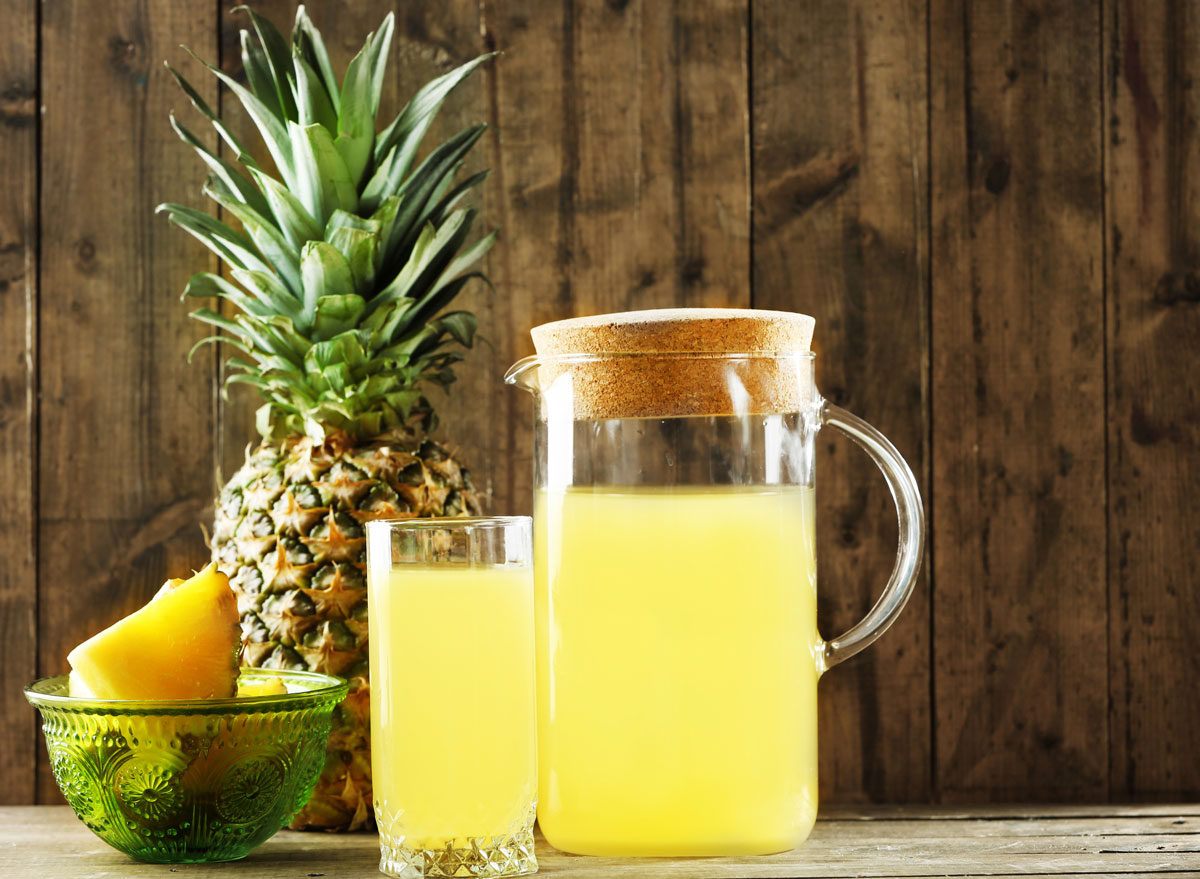
You may think you're doing yourself a favor by sipping on some fruit juice or a glass of sweetened iced tea instead of ordering an alcoholic beverage or a soda, but according to the Mayo Clinic, regular consumption of sugar-sweetened drinks is a big no-no.
That's because the medical center reports that regular consumption of sugary drinks has been proven countless times to be one of the drinking habits shortening your life and linked to weight gain, type 2 diabetes, heart disease, and stroke.
Additionally, a large study published in the journal Circulation revealed that people who drink more sugar-sweetened beverages have a greater risk of premature death—especially from heart disease—than do those who drink fewer.
As a result, the Mayo Clinic advises enjoying drinks such as water, tea, or unsweetened iced tea instead.
Energy Drinks

When it comes to energy drinks, the Mayo Clinic doesn't even advocate consuming these in moderation. By contrast, they're viewed as unhealthy, in part because of their high sugar and caffeine content.
According to Mayo Clinic research, knocking back just one 16-ounce energy drink can significantly increase your blood pressure as well as stress hormone responses. Additionally, previous studies have indicated that energy drinks are particularly harmful when you mix them with alcohol.
"In previous research, we found that energy drink consumption increased blood pressure in healthy young adults," noted Mayo Clinic study co-author Dr. Anna Svatikova. "We now show that the increases in blood pressure are accompanied by increases in norepinephrine, a stress hormone chemical, and this could predispose an increased risk of cardiac events – even in healthy people."
Instead of reaching for one of those sugar-laden energy drinks, the organization suggests trying to get quality sleep, maintaining a healthy diet, and increasing physical activity to naturally boost your energy levels.
Alcohol

The Mayo Clinic has no issue with people enjoying the occasional drink (phew!) but the organization cautions against drinking too much both in one sitting and over time.
Per the Mayo Clinic, high-risk drinking is defined as more than three drinks in one day or more than seven drinks in a week for women. For men over the age of 65, it's just one drink per day, and for men under the age of 65, it's more than four drinks on any day or more than 14 drinks a week.
"Occasional beer or wine with dinner, or a drink in the evening, is not a health problem for most people," explained Mayo Clinic doctor Terry Schneekloth, MD, in a Q&A. "When drinking becomes a daily activity, though, it may represent the progression of your consumption and place you at increased health risks. Alcohol can damage your body's organs and lead to various health concerns. For women, this damage happens with lower doses of alcohol, because their bodies have lower water content than men. That's why the moderate drinking guidelines for women and men are so different."
Given that intel, the Mayo Clinic advises drinking in moderation. As a general rule, that means no more than one drink a day for women, or two a day for men—which translates to roughly 12 ounces of beer, five ounces of wine, or 1.5 ounces of 80-proof liquor.
Ranch Dressing
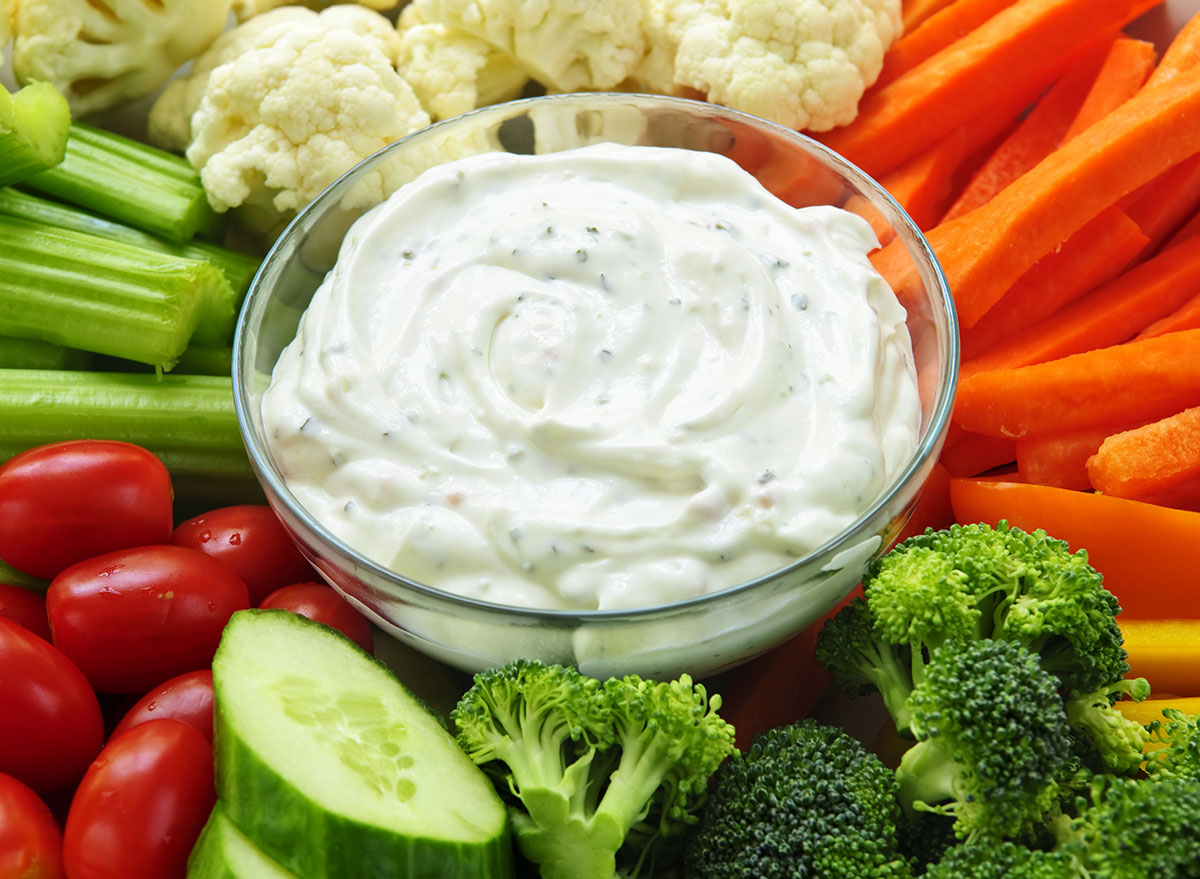
Sorry ranch dressing fans, the Mayo Clinic isn't a fan of this popular condiment. That's because ranch dressing contains 320 milligrams of sodium in a two-tablespoon serving. Eating this much sodium on a regular basis could lead to heart health issues like high blood pressure and increased risk of heart disease.
Additionally, the Mayo Clinic recommends adults keep their sodium intake below 2,300 milligrams each day—and specifically mentions avoiding foods with more than 200 milligrams of sodium per serving.
Other high-sodium foods that may exceed the Mayo Clinic's per serving recommendation include canned most canned soup, cold cuts, and pretzels. To help keep your sodium intake in check, look for foods marked low-sodium.
Margarine

On the surface, margarine, which contains unsaturated polyunsaturated and monounsaturated fats, may seem like a healthy alternative to high-calorie butter, but that's not necessarily the case.
According to the Mayo Clinic, not all margarines are created equal. "Some margarines contain trans fat, which is considered the worst type of fat you can eat. Unlike other dietary fats, trans fat raises your LDL cholesterol and also lowers your high-density lipoprotein, or HDL or 'good,' cholesterol," the organization explains. "A diet laden with trans fats also increases your risk of heart disease, as well as stroke and Type 2 diabetes." You'll have to watch out for more than just margarine to protect your heart. See: Popular Foods That May Lead to a Heart Attack, According to Science.


